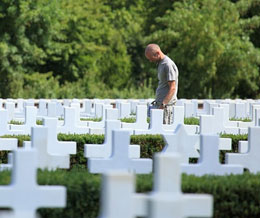Grief after a loved one has died…
Grief is a feeling that you shouldn’t be ashamed of when you’ve just lost a loved one. After all, your world will be gloomy all of a sudden when the love your life is gone. You will find that it’s really hard to cope with your sadness in the first few months after your loved one passes away. Especially if you loved that person who became really a part of you, moving on can be quite difficult.
After the death of your loved one, it’s really difficult when you wrestle with loneliness and depression or feel angry about being left alone. You may lose your appetite and find yourself eating little or not eating at all. You feel as if your stomach is turned upside down because of the sadness. You may lose enthusiasm towards the things that you love to do, and experience sleepless nights and fits of crying. The pressure of new responsibilities may suddenly fall on your shoulders, and drain your physical and mental energy. Doing routine things that you once used to do every day becomes more of a challenge at times like this. You may also find yourself troubled by spiritual questions, doubts or fears.
So how long does it usually take for a person to finally get over this kind of grief? There is no sure answer for that, as there’s no timetable for grieving. It depends on the person’s ability to get through the mourning phase — it may be sooner, or it may take several months or even years. Everyone grieves differently.

It’s normal and understandable that you may feel confusion, sadness, and anger after your loved one has died. You may also feel that you are lost and have no more purpose in this world. But you must pass through these stages of mourning to better deal with your loved one’s loss.
 Accept the reality of the loss
Accept the reality of the loss
Even though this is extremely hard to do, you must just accept the reality of the loss. It’s natural that you will feel a sense of denial that your loved one is not there with you anymore, physically. These activities that can all help you in this process include viewing the body after death, arranging and attending the funeral and burial, and visiting the place where your loved one has been finally laid to rest. You should also talk with others about the death of your loved one, and the circumstances surrounding his or her demise, because this will be helpful for you in dealing with loss. So what’s the point of all this? You need to mourn for the painful fact that your loved one will never be physically here any longer. If you manage to overcome this, afterward you should be comforted to know that he or she is not suffering any longer in this world, and he or she is in a happier state now. One day you’ll join him or her in “another world” where there is no pain, suffering or sorrow.
There is no other way or recourse in dealing with grief but to go through it
It’s not right when people try to bottle up their emotions, reject their sad feelings, or try to neglect the pain and sorrow just after a loved one has died. They may avoid going to places where they may remind them of their loss. But unfortunately, there are no shortcuts to grief. There is no other way or recourse in dealing with grief but to go through it. There is an adverse effect of rejecting grief — it will even affect your physical health if you are bottling up your emotions and not letting them all out. If you fully experience tearful pain or sorrow, it will actually provide you with genuine relief. It’s like getting some huge burden off your chest.
Adjust to the place where your loved one used to be
After going through relief there comes a time where you should adjust to an environment where your loved ones used to be. It is like filling a vacuum left by your loved one. Among other considerations, this means that you will assume some of the responsibilities that your departed loved one used to fulfill. For instance, you will need to do household chores that your wife used to do, or finally, learn to drive the car that your husband always did when he was alive. If you don’t like coming home to an empty house, you may consider buying or adopting a pet or inviting a friend or a relative to sleep over at your house.
Invest your energy you would have used in mourning, to somebody else still living
Your emotional energy in grieving for your departed loved one should never be considered as wasted. However, you may not wish to do this all your life, as this would take a toll on you. Rather, take this emotional energy you would have used in grieving for your lost loved one and spend it in another relationship (or relationships). This perhaps is the most important step in dealing with grief. This holds true, especially for spouses. Many people feel that they’re “betraying” their departed loved one when they start in a new relationship with someone else or form new attachments with several people. If you’re experiencing this, you shouldn’t feel guilty.
It’s ok to form new relationships because it’s a natural part of moving forward. The point of this task is not to forget your departed spouse, but rather you reach the point where you still can remember him or her without experiencing the paralyzing feeling of grief and sorrow. Your departed loved one in spirit might be happy to know that at least there’s someone in his or her place to love you and take care of you.
People who are still living in this world may come to you and/or serve as a purpose of helping you rebuild your own life. Form new friendships, too, that will allow you again to grow as a person with a new sense of purpose. Many surviving spouses find a sense of renewal when they take part in activities where they can meet new friends or develop a new relationship. Others focus their time, energy and love on their children, grandchildren, and great-grandchildren.
Conclusion
When living after the death of a loved one, you must face new tasks with a positive attitude and surround yourself with people who love and support you. We know that these tasks can be overwhelming, and seem easier said than done, but in the end, they can be very rewarding. When you do overcome that episode where you thought you wouldn’t be able to get through the death of your loved one, you are well on your way to a path towards healing — while still fondly remembering him or her. Though there still may be some tears, you’ll be left with more fond memories to be shared.
Related links
- Mourning – Wikipedia, the free encyclopedia
- Coping with Grief and Loss: Support for Grieving and Bereavement
There is no right or wrong way to grieve, but there are healthy ways to cope with a loss. These tips can help.


 Accept the reality of the loss
Accept the reality of the loss